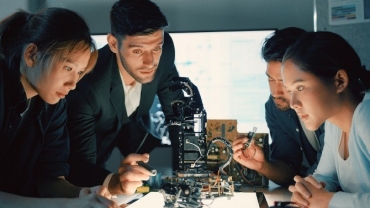

“Nothing AI-generated will go out masquerading as journalism”: Rachel Corp, ITN
The importance of insights and experience - from the newsroom to the boardroom - in delivering digital transformation in a challenging media industry.
Rachel Corp’s career path to become CEO at ITN has not been a typical one.
While many CEOs may have stepped up from other C-suite roles or swapped one CEO role for another, Corp moved from newsroom to boardroom, having previously been Editor of ITV News.
“I come from a commercial news background, and the fantastic thing about ITN is that news is at the heart of what we do,” says Corp, whose company produces news and current affairs programmes for the likes of Channel 4, Channel 5 and ITV.
However, with the media industry dealing with a host of challenges, from a competitive landscape complicated by Big Tech to polarised politics driving public criticism of the media, Corp believes her experience in the newsroom is particularly relevant.
The importance of empathy and personal experience
“In times such as now, it helps to know the business from within and have a deep understanding of the people,” she says. “I know every role and what's involved in it. Whether that's being out in a war zone or creating long form programmes.”
While some journalists may recount stories of senior management being removed from the roles and realities of journalism, Corp says her own background helps, for example, ensure the right duty of care is observed when newsroom teams are working on emotionally distressing stories.
“We provide a lot of support. Because I know from my own experience, it doesn't stop when you leave work. You don't just do your shift and go home. It's all encompassing and everybody's lives are wrapped up in it.”
Driving and championing digital transformation
Digital transformation is another area where Corp’s background as an Editor has helped inform her decision-making as a CEO.
“It's an absolute strategic priority,” she says. “We still have fantastically stable television contracts, but we all know which direction content is going.”
“Digital transformation is in all of our strategic discussions. I drive it and I champion it, because I believe in it. And coming from a newsroom, I do understand the technology, its limitations and possibilities. But that doesn't mean I know technology better than the technology team.”
Instead Corp is focused on creating a culture of collaboration and innovation where great ideas are encouraged from interns and senior executives alike. And that culture is underpinned with investments in agile, scalable infrastructure.
“We are seeing a switch to much more flexible, cloud-based solutions, rather than just buying hardware and depreciating it over five years,” she says.
“Transformation is so rapid in our industry that you have to build systems that are adaptable.”
Corp says ITN’s transformation has seen major milestones such a refresh of tech in all its newsrooms and the opening of a remote studio in Leeds that can be operated from London. But through recruitment and upskilling there has also been a steady drumbeat of ongoing innovation, including a greater focus on in-house software development, moving teams onto shared systems to remove operational silos, and constant improvements in the way ITN creates and delivers digital content.
Journalists must remain in control of journalism
But while Corp is a champion for digital transformation, some areas are non-negotiable. Last summer, Corp wrote to Government ministers calling for them to take a proactive stance to protect journalism from the impact of AI in the run up to general elections due to take place this year. ITN along with other news organisations is now working with the Culture Secretary on that issue. ITN is also a signatory of The Paris Charter on AI and Journalism, launched last November at the Paris Peace Forum.
“We can’t afford to be complacent about the impact AI could have on trusted news sources and our democratic discourse. That is why nothing AI-generated will go out masquerading as journalism.”
ITN is very actively exploring the potential of GenAI but going against its own editorial values in the name of experimentation is off limits.
“GenAI is huge for us, as it is for everybody. But for me there's lots of levels to it,” she says. “At the top level, it's about protecting our brand and our journalism. We are not going to replace any of that journalism.”
Instead, Corp says ITN is encouraging teams to experiment in areas such as document and data analysis.
It is also focused on addressing risks posed to media companies by GenAI, including the harvesting of content - an issue Corp has been lobbying the government about.
“We're trying to get some accountability, particularly for the large language models to be open about what they've used, so we can all negotiate fair value and accountability around outputs.”
Checking sources and holding organisations to account could also be held up as behaviours becoming of a former editor. But for all the relevance Corp draws from her background, she knows there are areas where she has to keep her past life in check.
“I would never tell my editors what to put in their programmes,” she says. “I wouldn't have taken that when I was an editor.”
“If they need to come to me, I'm there. And for really controversial reputational risk issues, they have to put me in the picture. But it's very rare that there's something where I might intervene.
“I watch the programmes at night,” she says. “But I don't want to get involved. I've done that.”
“I've now got to run the rest of the business.”
Contact us










